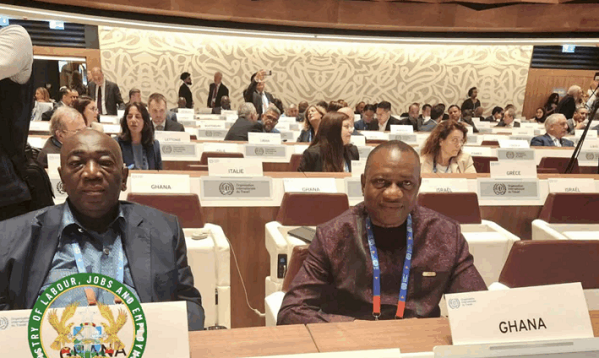The Ghana Trades Union Congress (TUC) has affirmed its commitment to collaborate with the Government and employers to advance maternity protection in Ghana.
“Maternity protection is not just about individual rights, it is about social justice, gender equality, and national socio-economic development,” Joshua Ansah, the Secretary-General of Ghana TUC, stated at the 113th Session of the International Labour Conference (ILC) in Geneva, Switzerland.
He reiterated that when women are protected during pregnancy and childbirth, it strengthens families, improves child health outcomes, and enhances workforce participation.
He said maternity protection was an investment in future generations and in resilient economies and societies
“We believe that no woman should have to choose between motherhood and employment. And no society should accept that childbirth leads to job loss or poverty,” Mr. Ansah said.
“When we protect pregnant women at work, we protect the future of our societies.”
Mr. Ansah said Ghana currently provides 12 weeks of maternity leave, which might be used before or after childbirth.
He noted that while flexibility was important in some cases, in practice, it often results in inadequate recovery time for mothers after post-delivery.
He said some women might choose or be encouraged to use more of their leave before delivery, leaving them with insufficient rest and bonding time after childbirth.
Mr Ansah said, moreover, though maternity extension was available to women on the production of a medical certificate, the law does not expressly provide for the automatic extension of maternity leave in cases of late childbirth, a situation which was not uncommon, and leaves affected workers uncertain about their entitlements.
“We strongly recommend, in line with current standards, that the revised law establishes a minimum of six weeks of compulsory postnatal leave,” he said.
This, Mr. Ansah said, would not only safeguard maternal health but also eliminate legal ambiguity and enhance enforcement.
He underscored that the question of cash benefits during maternity leave was also critical.
He said that currently, Ghana relies on two main arrangements: Health care during pregnancy and childbirth, which is covered under the National Health Insurance Scheme (NHIS).
And payment of Wages during leave, including maternity leave, by the Employer.
Mr. Ansah said while these mechanisms were important and must continue, the law review might explore additional income protection options especially for mothers who might seek further extended leave as well as vulnerable workers, especially those in the informal economy or in precarious employment, who might not receive income during maternity leave, or might be discouraged from taking the full leave they need.
On the issue of protection against dismissal, the Secretary-General said the current Labour Act rightly states that a woman shall not be dismissed because of her absence on maternity leave.
He said, however, that as workers, they were concerned about enforcement in practice.
Mr. Ansah said cases of dismissal or discrimination on grounds of pregnancy might go unreported, either because women fear retaliation or because the systems to lodge complaints were inaccessible or ineffective.
Adding that some violations escape labour inspections and remain undocumented.
He said the TUC was therefore proposing that the legal protections be strengthened in two ways.
First, through clearer and stronger legal language that defines discriminatory practices and sets sanctions.
Second, through the establishment of effective enforcement mechanisms, including improved labour inspections, grievance redress systems, and data collection tools that can capture violations more accurately.
Ghana’s Delegation to the 113th Session of the International Labour Conference (ILC) was led by Dr Abdul-Rashid Hassan Pelpuo, the Minister of Labour, Jobs and Employment.
GNA





